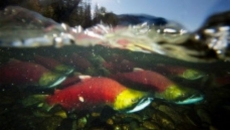A massive amount of land has already been scorched by wildfires in Canada this year, and federal fire officials warn the hot, dry weather fuelling the burns is nowhere near over.
#BCWildfire is responding to the Salmon River Wildfire (K40541), located approx 14 km east of Falkland. It is currently classified as Being Held and estimated at 4.7 hectares. BCWS personnel and RCMP are on site and BC Hydro is responding. pic.twitter.com/Bp7FaA3mW7
— BC Wildfire Service (@BCGovFireInfo) May 31, 2023
The unusually severe start to fire season is prompting warnings to Canadians to know their risk and concerns about a shortage of firefighters as many jurisdictions are now in competition with each other for the number of trained workers available.
"These conditions this early in the season are unprecedented," said federal Emergency Preparedness Minister Bill Blair.
"The situation in Canada today is very dangerous."
He said the amount of land already burned is more than 10 times the average amount of land burned by June 1 over the last 10 years.
It's equivalent to five million football fields, or almost five times the size of Prince Edward Island.
As the situation in Alberta grew quickly out of control in early May, the Canadian military moved in to help, and the Canadian Interagency Forest Fire Centre also helped commission firefighters from other provinces and other countries.
But federal officials said in a briefing to reporters Thursday that the fire situation is troublesome almost everywhere now, and those provinces need their staff back at home.
The centre's daily report on the fire situation says demand for firefighting personnel and equipment from other jurisdictions "is extreme," but the "national availability of resources is limited," so they're turning to international partners for help.
Canada has agreements to share firefighters with six other countries — the United States, Australia, New Zealand, South Africa, Mexico and Costa Rica.
To date, the centre said 566 firefighters have travelled between provinces this year to help other jurisdictions, and another 443 firefighters and other trained experts have come to Canada from the U.S., Australia and New Zealand.
Most of them to date have gone to Alberta, where more than a million hectares burned in May.
Currently, the biggest threats are in Atlantic Canada, particularly in Nova Scotia.
Federal officials said another 100 firefighters from the U.S. will arrive in Atlantic Canada over the next few days, and they are also expecting more than 200 firefighters from South Africa in the coming days. It is not certain yet where those people will be sent.
There are also ongoing discussions with Mexico, officials said.
But Blair said the particularly challenging nature of this season, when big fires are burning in so many different regions, is a concern for having enough people and equipment where and when they are needed.
Burnout is also an issue, as many firefighters work days on end in extremely harsh conditions.
"We are, quite frankly, quite concerned with the early onset and, frankly, almost without precedent the extreme number of fires that we've already experienced so far this year. And we are very concerned about risk that current conditions present," he said.
"There are a limited number of resources."
Natural Resources Minister Jonathan Wilkinson said Canada is moving on the first phase of a Wildfire Training Fund to hire and train Indigenous firefighters in their own communities, 300 new firefighters and another 125 Indigenous fire guardians are being trained this season.
His department is also working to help retrain urban and rural municipal firefighters, who are mostly trained to battle blazes in buildings, to help respond to wildfires as they increasingly encroach on urban areas.
More than 200 homes have been burned in Halifax as the Tantallon fire erupted and spread extremely fast over the weekend.
Wilkinson said six provinces and territories have also already taken advantage of a new $256-million federal fund for wildfire equipment. He said he expects all provinces and territories to use it this year.
Blair said the government accepted Nova Scotia's request for federal aid almost immediately Wednesday and the military is already preparing to send in additional help.
As of mid-afternoon Thursday, the Canadian Interagency Forest Fire Centre was reporting 209 active fires burning in eight provinces as well as in the Northwest Territories — and 87 of them were out of control.
There are about 28,000 people currently evacuated from their homes, including 18,000 in Nova Scotia alone. There were 25,000 evacuees in Alberta in May, but most of them have been able to return home.






